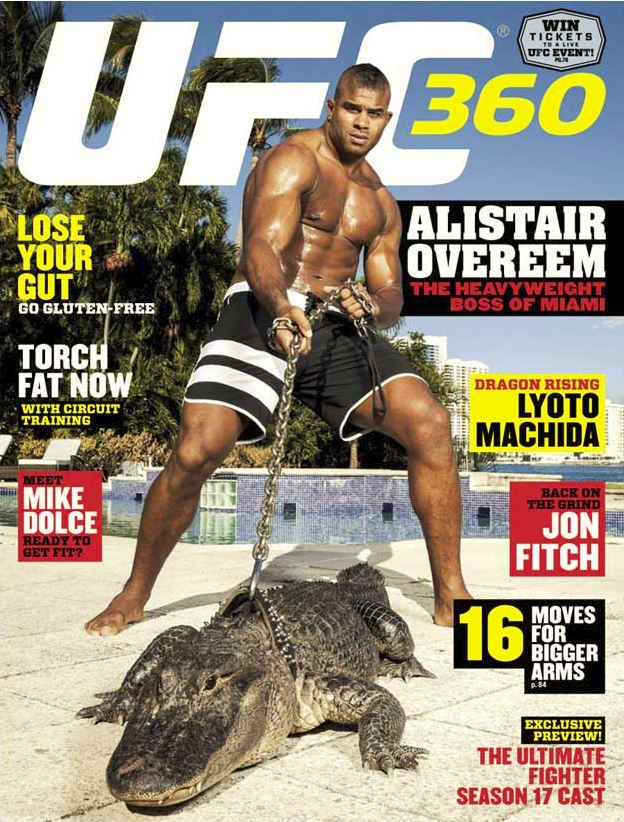
Announcements
Take the same fitness test that strength coach Joel Jamieson uses to evaluate UFC athletes like UFC on FOX headliner Demetrious Johnson and see how you stack up against the best.
History was made in September when Demetrious "Mighty Mouse" Johnson was belted as the UFC's first flyweight champion. It was the culmination of years of hard work and dedication from Johnson, his fight trainer Matt Hume, and his strength coach Joel Jamieson. Now he's set to defend that title again at UFC on FOX: Johnson vs. Moraga this Saturday, live and free on FOX.
Here, Johnson shows some of the nine fitness and performance tests that you can do to see how you measure up to the fighters Jamieson has trained. Comparing your scores to athletes' is just a fun exercise. The fit test will, however, establish a very important baseline, allowing you to gauge your progress when you retake the test at a later date.
Tip: Before each exercise test, warm up by performing a practice set or two, or jogging before the run. Have a spotter on hand for the weight-bearing exercises.
Resting Heart Rate
Resting heart rate is a simple, yet effective gauge of general aerobic fitness. The best time to take your resting heart rate is first thing in the morning; it's best taken when lying on your back. Skip caffeine and stimulants of any type before your test. To take the test, check your pulse and count the beats for 15 seconds, then multiply that number by four.
SCORE TO BEAT: 44, flyweight Demetrious Johnson
 10s Push-Ups
10s Push-Ups
Test your upper-body power by completing as many full-range push-ups as you can in 10 seconds. Your chest must touch the ground at the bottom of each repetition; your elbows must be completely extended at the top.
SCORE TO BEAT: 18, middleweight Tim Boetsch
Triple Jump
Perform three consecutive double-foot jumps (bounding, as in, jumping forward). Take off and land on both feet at the same time for maximum distance. The distance should be measured from the front of your toes at the beginning position to the back of your heels after your final jump. Your takeoff is your first jump, and the test ends when you land on your third jump. No pausing between jumps, and you must "stick" the landing -- it doesn't count if you fall.
SCORE TO BEAT: 28.5 feet, lightweight Caros Fodor Maximum Pull-Ups
Maximum Pull-Ups
The maximum number of full-range pull-ups you can do is one of the best measures of relative strength ever devised. Your goal is to complete as many reps as possible using strict pull-up technique. Because it can be fairly easy to get a few extra reps if you use bad technique, be sure to follow the guidelines closely. Use an overhand grip on the pull-up bar (hands can be at any width); each rep must begin from full extension (arms straight overhead) and end with your chin completely over the bar; and no swinging or "kipping" allowed. Reps that don't meet the criteria don't count!
SCORE TO BEAT: 35, flyweight Demetrious Johnson
1.5 Mile Run
The only guideline is simply to run as fast you can for 1.5 miles.
SCORE TO BEAT: 7:46, welterweight Matt Brown
Maximum Push-Ups
Perform as many full-range push-ups as
possible, using the same guidelines as in the "10s Push-Up" test, but do
not stop until you are unable to complete another push-up. You may not
pause for longer than 1-2 seconds at the top or bottom of any rep. You
may perform the reps at any speed, as long as each one is from
chest-to-the-floor all the way up to the full extension.
SCORE TO BEAT: 98, middleweight Chris Leben
Front Plank
This test measures the muscular endurance of your core -- research has shown this type of strength is important for performance and injury prevention. Begin by starting on your forearms and toes with a flat back and neutral spine. Maintain this position for as long as you can.
SCORE TO BEAT: 3 minutes 5RM Barbell Squat
5RM Barbell Squat
"5RM" stands for "five rep max" and refers to the greatest amount of weight you can lift for just five repetitions of good technique and measures your lower body maximum strength. Warm up with 2 sets of 8-10 reps at a moderate weight, then begin adding weight to the bar and doing sets of 5 repetitions. After each set, add 10-20 pounds to the bar and repeat until you reach the maximum weight you're able to squat for five full reps (usually 2-4 sets).
Strict technique is important for accurate results and safety: From the standing position, lower the weight until the top of the thighs reach 90 degrees, i.e., parallel with the floor. Always control the weight -- no bouncing out of the bottom position. Your feet may be positioned at any width desired. Rest for 2-4 minutes between sets.
SCORE TO BEAT: 415 lbs., middleweight Tim Boetsch
3RM Bench Press
As in the 5RM squat test, you will work up to the maximum weight you can lift for the number of repetitions; in this test, you will work up to a three-rep maximum. Start as you did with the 5RM and add weight. The bar must touch your chest in the bottom and be fully locked out at the top. Your hips must remain in contact with the bench at all times.
SCORE TO BEAT: 350 lbs., middleweight Tim Boetsch

the Ultimate Fighting Championship, available now in print and
digital editions. Photos by Eric Williams


